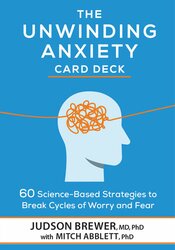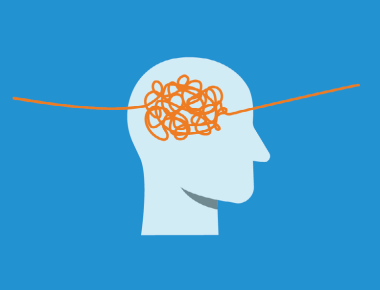Unwinding Anxiety with Mindfulness Training
Watch a quick demonstration to see how anxiety can be treated in the same way as other habits or addictions

I work with a lot of folks who are trying to quit smoking. For example, I had a gentleman who had been smoking for about 40 years. When we calculated the number of times he reinforced this habit loop, we found it was about 293,000 times.
But he tried everything to quit. He tried medication. He tried quitting cold turkey and nothing worked. The problem was that he didn't know how his mind worked.
The first thing we did was to help him start paying attention and understanding this habit loop process. It might seem strange that paying attention to your behavior would actually change it, yet this is right at the crux of how mindfulness works.
I'll give you another example. As you pay attention when you smoke a cigarette, you start to notice new things. I had a client do a mindfulness smoking exercise and really pay attention as she smoked. She commented, “It smells like stinky cheese and tastes like chemicals.”
I bring this forward because this is at the heart of reward-based learning systems. Reward-based learning is based on rewards, not on the behavior itself. If behavior change were as simple as focusing on the behavior, we’d simply tell ourselves to stop smoking and then we’d stop, or we’d tell ourselves to stop eating cake and we’d stop doing it.
That's not how our brains work. Our brains work based on how rewarding a behavior is. If we can see clearly how unrewarding it is, then we start to re-evaluate that process.
For example, unpleasant thoughts or emotions, like fear and anxiety, can trigger worry that makes us feel like we're in control. Yet when we realize worry doesn't solve problems, give us control, or even feel good, the reward value drops. It can then spiral out and feed more anxiety, which then feeds more worry.
Now, you might ask yourself, how can anxiety be treated in the same way as other habits or addictions? It turns out there's quite a bit of literature showing that anxiety can be negatively reinforced just like any other behavior...
See how mindfulness training can help clients understand their destructive behaviors and step out of this cycle:
*This is an adapted excerpt from Tapping into our Brains to Break Anxiety Cycles and Other Habits by Judson Brewer. You can purchase the full digital seminar here.
But he tried everything to quit. He tried medication. He tried quitting cold turkey and nothing worked. The problem was that he didn't know how his mind worked.
The first thing we did was to help him start paying attention and understanding this habit loop process. It might seem strange that paying attention to your behavior would actually change it, yet this is right at the crux of how mindfulness works.
I'll give you another example. As you pay attention when you smoke a cigarette, you start to notice new things. I had a client do a mindfulness smoking exercise and really pay attention as she smoked. She commented, “It smells like stinky cheese and tastes like chemicals.”
I bring this forward because this is at the heart of reward-based learning systems. Reward-based learning is based on rewards, not on the behavior itself. If behavior change were as simple as focusing on the behavior, we’d simply tell ourselves to stop smoking and then we’d stop, or we’d tell ourselves to stop eating cake and we’d stop doing it.
That's not how our brains work. Our brains work based on how rewarding a behavior is. If we can see clearly how unrewarding it is, then we start to re-evaluate that process.
For example, unpleasant thoughts or emotions, like fear and anxiety, can trigger worry that makes us feel like we're in control. Yet when we realize worry doesn't solve problems, give us control, or even feel good, the reward value drops. It can then spiral out and feed more anxiety, which then feeds more worry.
Now, you might ask yourself, how can anxiety be treated in the same way as other habits or addictions? It turns out there's quite a bit of literature showing that anxiety can be negatively reinforced just like any other behavior...
See how mindfulness training can help clients understand their destructive behaviors and step out of this cycle:
*This is an adapted excerpt from Tapping into our Brains to Break Anxiety Cycles and Other Habits by Judson Brewer. You can purchase the full digital seminar here.
Help Clients Step Out of Anxiety

Based on the New York Times best-selling book Unwinding Anxiety, this deck by Dr. Judson Brewer and Dr. Mitch Abblett features 60 research-based practices to help you identify and overcome unhelpful anxiety responses, or habits, that prevent you from living life to the fullest.
Grounded in the science of mindfulness, each exercise harnesses your brain’s innate power to create new responses to anxiety triggers, so you can:
Grounded in the science of mindfulness, each exercise harnesses your brain’s innate power to create new responses to anxiety triggers, so you can:
- Form new habits that interrupt your anxious cycles
- Focus on what works instead of trying to control your anxiety
- Explore the misleading “payoff” of anxious habits
- Step out of worry and rumination and into healthy, fulfilling experiences
- Create bigger, better habits that build kindness, curiosity, and gratitude
Meet the Expert:
Jud Brewer MD, PhD (“Dr. Jud”) is a thought leader in the field of habit change and the “science of self-mastery”, having combined over 20 years of experience with mindfulness training with his scientific research therein. He is the Director of Research and Innovation at the Mindfulness Center and associate professor in Behavioral and Social Sciences and Psychiatry at the Schools of Public Health & Medicine at Brown University. He also is a research affiliate at MIT. A psychiatrist and internationally known expert in mindfulness training for addictions, Brewer has developed and tested novel mindfulness programs for habit change, including both in-person and app-based treatments for smoking, emotional eating, and anxiety. He has also studied the underlying neural mechanisms of mindfulness using standard and real-time fMRI and EEG neurofeedback. He has trained US Olympic athletes and coaches, foreign government ministers, and his work has been featured on 60 Minutes, TED (4th most viewed talk of 2016, with 14+ Million views), the New York Times, Time magazine (top 100 new health discoveries of 2013), Forbes, BBC, NPR, Al Jazeera (documentary about his research), Businessweek and others. His work has been funded by the National Institutes of Health, American Heart Association, among others. Dr. Brewer founded MindSciences to move his discoveries of clinical evidence behind mindfulness for anxiety, eating, smoking and other behavior change into the hands of consumers. He is the author of The Craving Mind: from cigarettes to smartphones to love, why we get hooked and how we can break bad habits (New Haven: Yale University Press, 2017).
Learn more about their educational products, including upcoming live seminars, by clicking here.
Learn more about their educational products, including upcoming live seminars, by clicking here.



